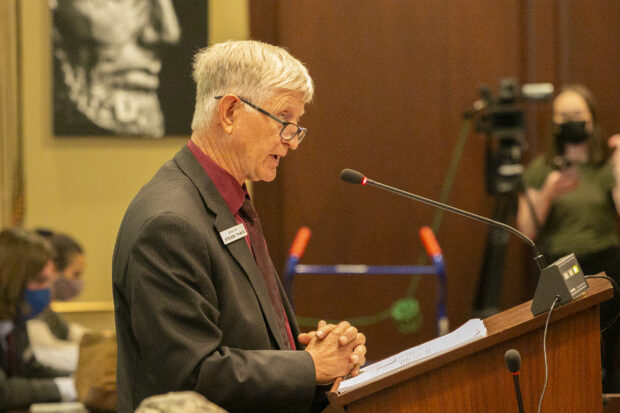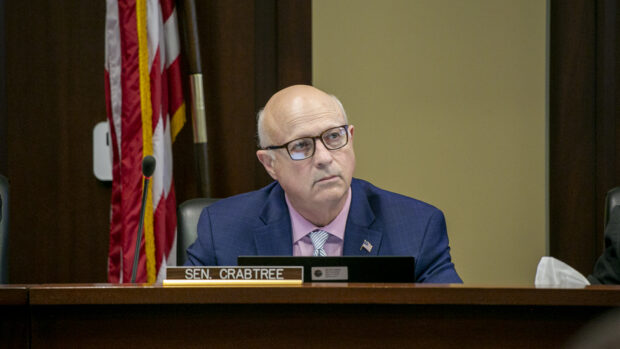An all-day kindergarten bill hit a major snag Tuesday afternoon, when a Senate Education Committee meeting came to an abrupt and tense end.

“I think we need to adjourn the meeting and have some discussion,” said a visibly irritated Chairman Steven Thayn, R-Emmett, before dropping the gavel on Tuesday’s meeting.
The 90-minute meeting ended without a vote — but with two competing motions on the table. Sen. Carl Crabtree, R-Grangeville, wanted to send the bill to the Senate floor for amendments. Thayn wanted to send the bill to the floor as is, for a Senate vote.
The abrupt adjournment left committee members and education stakeholders baffled and surprised. Seated two chairs away from Thayn on the committee dais, Crabtree stared, mouth agape, at the chairman. Thayn could clearly be heard admonishing Crabtree.
“You should have talked to me before the meeting,” Thayn told Crabtree. “If you’re going to do something this important, you should have talked to me.”
The end-of-meeting drama highlighted a policy debate that emerged throughout the hearing on Senate Bill 1373. The debate centered on how the state should carve up $72 million for early literacy programs — a menu of programs that could include optional, all-day kindergarten.
Thayn defended SB 1373’s revamped formula.
Half of the money would go out to schools based on enrollment, but the other half would go to schools based on how many of their students score proficient on the Idaho Reading Indicator, or show improvement on the screener. Under the current formula, literacy dollars go out to schools based on their numbers of at-risk readers — students who score poorly on the IRI.
“If you want to have stable funding now, you need to have low reading scores,” said Thayn.

Crabtree said he wanted to make sure the new formula doesn’t penalize lower-performing districts — such as the rural schools in his north-central Idaho legislative district.
During the public hearing, education groups endorsed SB 1373, but some were less than enthusiastic.
Idaho School Boards Association Deputy Director Quinn Perry said she was worried that schools would not receive stable funding for all-day kindergarten.
Idaho Business for Education CEO Rod Gramer said the new funding formula could prove “counterproductive,” taking funding away from at-risk students. “(It’s) not really the bill that many of us would like it to be,” he said. “What we have instead is a compromise bill that is not perfect.”
Committee Democrats voiced similar concerns — and they were cautious about pinning all-day kindergarten programs on the IRI. “This is a pretty high-stakes test for 5- or 6- or 7-year-olds,” said Sen. Janie Ward-Engelking, D-Boise.
The debate quickly turned to political considerations.
Thayn — who said on Monday that SB 1373 would be the only all-day kindergarten bill his committee would hear — noted the bill had support from House Education Committee members, and said the bill could pass both houses. Thayn also said Gov. Brad Little has endorsed the plan, which would boost literacy spending from $26 million a year to $72 million. He said the end-of-session compromise would give all schools a boost in literacy funding, which they could use for all-day kindergarten. And he said the formula could always be tweaked in future legislative sessions.
Sen. Lori Den Hartog, R-Meridian, supported Thayn’s push for a Senate vote. Sending the bill to the floor for amendments could be “pretty chaotic,” she said.
When a bill is up for amendment, any senator can propose changes of any kind — which can be made with majority support.
After working on all-day kindergarten legislation for more than a year, Crabtree said he wanted to come up with some way to support at-risk students, and get the formula right the first time. “It’s been a long and winding road with a few cliffs,” he said. “I think we’ve gotten close to where we need to be.”
Now, the road to an all-day kindergarten law is tougher to map.
Thayn noted during Tuesday’s hearing that all-day kindergarten is a priority for Little — and he argued that amending the bill could extend the 2022 session.
As he left the committee room Tuesday afternoon, Crabtree said he could probably live with SB 1373, but first, he wants to push for something better. “We don’t want the poor to get poorer.”
And as committee vice chairman David Lent left the committee room — after sitting between Thayn and Crabtree during their tense post-hearing exchange — he still expressed optimism.
“We’ll end up with a bill,” said Lent, R-Idaho Falls. “We’ve just got to work through it.”
